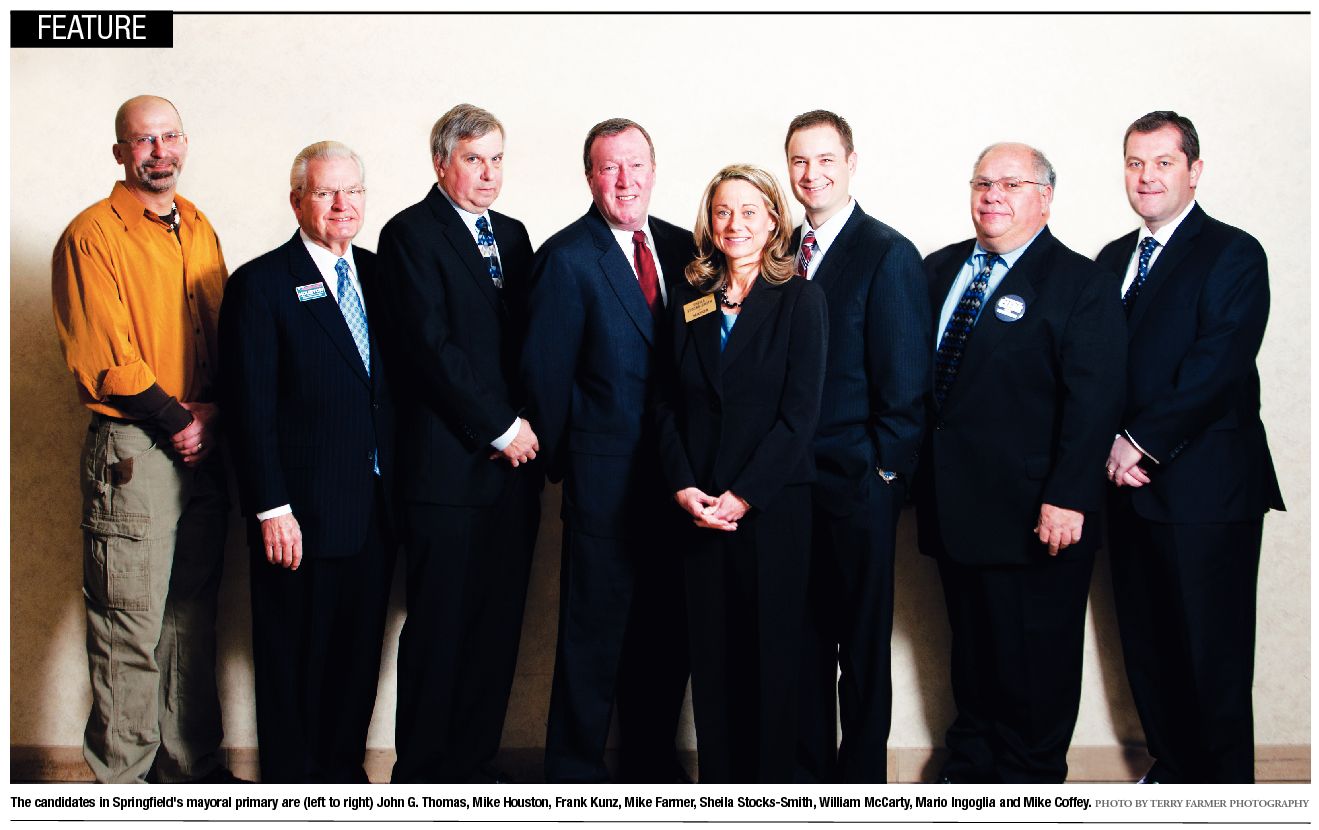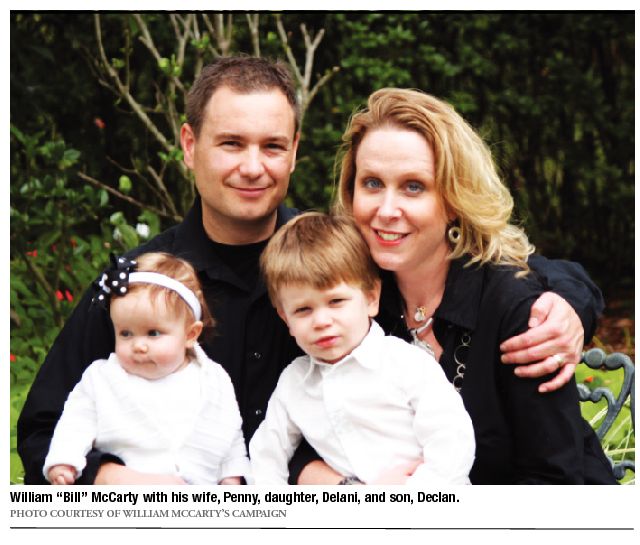
Will the next mayor please step forward?
So many candidates, so few bold ideas
POLITICS | Patrick Yeagle
Every candidate has ideas for what they will do when they are elected mayor. Spend more wisely, they say. Encourage business growth, develop the medical district and bring in more tourists. Get rid of unneeded political hires and look for inefficiencies in city government. These are positive ideas, but they are hardly visionary, and every candidate in the upcoming mayoral primary seems to be pushing them.
Springfield is at a crossroads, faced with both difficult choices and opportunities to redefine itself. The city is strapped for cash and already expecting a $4 million hole in next year’s budget. A possible railroad consolidation could dramatically change the city for generations, while many roads and sidewalks are in need of repair. Racial, economic and geographic barriers continue to drag down development and achievement. The political environment is ripe for daring new ideas that could set the tone for decades to come. But ideas seem to be the ingredient missing from this campaign.
Seven candidates will appear on the Feb. 22 primary election ballot, and although there is a mix of Republicans, Democrats and independents in the race, the differences between what the candidates say are negligible. In elections such as this, where there is no real ideological question at stake, other factors start to become much more important, says Dr. Kent Redfield, professor emeritus of political science at the University of Illinois Springfield.
“Campaigns are always relational; they’re always defined by who you’re running against, and there’s an opportunity to distinguish yourself in a comparative setting,” Redfield explains.
“Character, confidence and the general quality of a candidate becomes more important when there isn’t a clear ideological difference.”
In the running is Republican Mike Coffey Jr., while Republican-leaning candidates Mike Houston, William McCarty, Mario Ingoglia and Mike Farmer are running as independents. Democrats Frank Kunz and Sheila Stocks- Smith will appear on the ballot as well, while an eighth candidate, John Thomas, is a write-in whose name will not appear on the ballot. However, it seems this election will be decided less on where the candidates stand politically and more on their relative strengths – especially in terms of experience, support, campaign funds and ideas.
A candidate’s political experience is one of his or her most important assets in a campaign. Examining experience tells voters who a candidate is and how he or she is likely to handle future issues. The candidates in this race have widely varying levels of experience. Perhaps the candidate with the most relevant political experience is Mike Houston, 66, who previously served two terms as Springfield mayor and has served on numerous advisory boards, including the Western Illinois University Board of Trustees, the Greater Springfield Chamber of Commerce and St. John’s Hospital.
“If there was ever a time when this city needs someone who has an understanding of finances, it is now,” Houston says, referencing also his business experience, which includes being for mer president, chairman and CEO of Town and Country Bank in Springfield. “I think the last 24 years that I’ve spent in banking is certainly an asset in this race… I bring a very unique background that no one else in this race has.”
It’s difficult to rank the experience of remaining candidates, however. William “Bill” McCarty, 35, served as a board member and village president of Williamsville before he moved to Springfield and works in state government handling public finance. Frank Kunz, 55, has served as Ward 3 alderman for 12 years, while Mike Coffey, 40, was elected in 1997 to the board overseeing the Prairie Capital Convention Center (PCCC) and has served as chairman since 2003. Sheila Stocks-Smith, 49, was director of the Office of Education Liaison under the late mayor Tim Davlin from 2003 to 2010 and has worked closely with nonprofits and community organizations in numerous other roles.

Mike Farmer is director of the city's Office of Planning and Economic Development, and he also worked as former vice-president of the Greater Springfield
Chamber of Commerce and a regional manager of what is now the state
Department of Commerce and Economic Opportunity. Mario Ingoglia, 52, has
no political experience, though he has been involved with the Vinegar
Hill Neighborhood Association and produces his own TV show about
politics on Access 4.
The
endorsements a candidate receives can make all the difference in
garnering votes. The right endorsement can persuade voters to choose one
candidate over a similar candidate, or it can make a candidate seem
more legitimate to the public and the media. In this race, some
candidates have actively sought endorsements, while others have eschewed
the practice in an apparent effort to seem more independent.
The
Sangamon County Republican Party has endorsed Mike Coffey, who also has
the support of the Laborers’ Local 477 union, the Southern Central
Illinois Laborers’ Political League, Sangamon County Clerk Joe Aiello,
and several businesses in town. The Sangamon County Democratic Party has
not endorsed a candidate in the primary, but is expected to do so for
the general election. Sheila Stocks-Smith has the backing of U.S. Sen.
Dick Durbin and several other prominent local Democrats, as well as the
Sangamon Valley Group of the Sierra Club. Mike Farmer has the support of
former Sangamon County Democratic Party chairmen Tim Timoney and Todd
Renfrow, who is also the former manager of City Water, Light &
Power.
Mario Ingoglia, Frank Kunz and William McCarty each indicated to Illinois Times that they weren’t seeking endorsements because they didn’t want to be beholden to anyone.
The
effect that each candidate’s endorsements – or lack thereof – will have
on the race remains to be seen. Endorsements are important for campaign
cash and for getting out the vote on election day. Because this
election does not seem to revolve around any major ideological question,
voters may not vote along party lines, so the most important
endorsements in this race may be those that come from household names like Durbin and Renfrow.
Closely
related to endorsements is campaign cash. A well-funded campaign allows
a candidate to spread his or her message in every available medium, but
a lack of campaign cash can make the public question a candidate’s
legitimacy.
Currently,
Mike Coffey Jr. leads in fundraising, claiming more than $125,000 in
contributions. Coffey has put out direct mail flyers, erected billboards
and even purchased air time during the Super Bowl. Coffey’s extensive
business contacts, built through his service on the PCCC board and as
part owner of Saputo’s Italian Restaurant in Springfield, have helped
him get the monetary support of several Springfield businesses.
No
other candidate comes close to Coffey’s war chest. Frank Kunz reports
having raised $25,000, and Sheila Stocks-Smith has raised about $46,000.
Filings with the Illinois State Board of Elections show Mike Farmer had
raised $18,880, while Mike Houston had raised about $35,900 as of Feb.
7. Mario Ingoglia told Illinois Times he has about $100 in his campaign fund.
“I’m mostly doing it all myself out of my own pocket,” Ingoglia says with an ever-present smile.
Candidates
who have high levels of name recognition, such as Farmer, Kunz and
Houston, may be able to get by with less campaign cash because they have
already created a brand of sorts for themselves through being in the
public eye. So while Coffey has a major advantage in terms of campaign
funding, he must use it to raise his public profile because he is
relatively unknown – despite his service on the PCCC board.
A
candidate who trails in campaign cash can also make up for it by using
the news media to generate public interest. Sheila Stocks-Smith, for
example, held a press conference at Springfield Clinic on Feb. 7 to
publicize her plans to enhance the city’s medical district if elected. That
type of maneuver costs the candidate very little, but raises their
public profile and helps the public associate their name with ideas.
continued on page 14